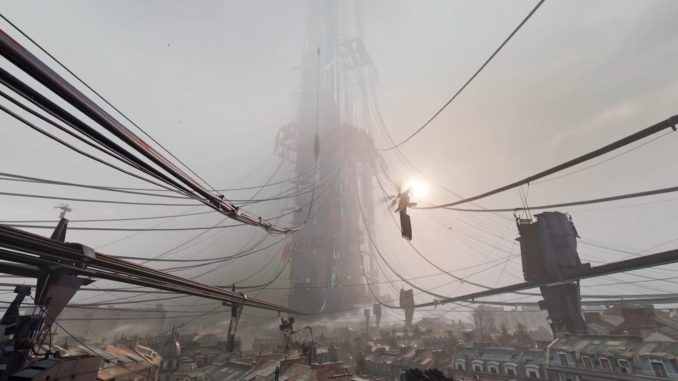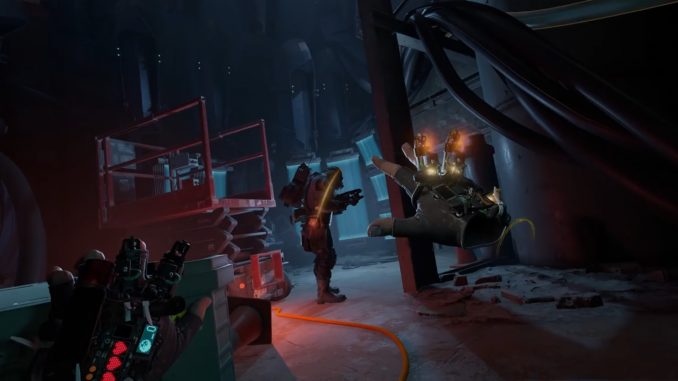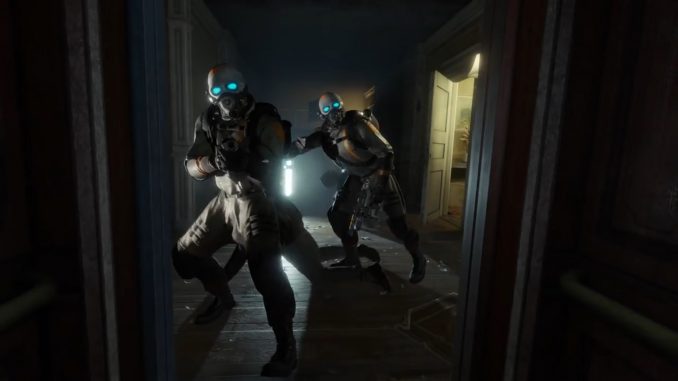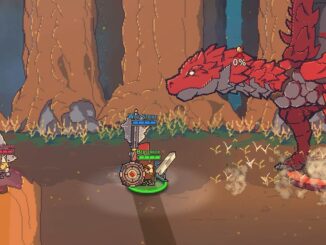
Today, Valve provided further details about the latest installment to the Half-Life franchise titled Half-Life: Alyx. The developer provided a trailer, a release date, and other details such as the fact that there will be multiple VR platforms, at various price points, that will work with the game. But while the game looks great, I have two reasons why Half-Life: Alyx will not be a day-one purchase for me.
However, before I provide those reasons, I want to talk about what I love about this game judging it solely by what Valve has shown us and what details were provided about HL:A. First of all, the graphics. The game looks gorgeous and, as is the purpose of the Half-Life franchise, properly shows what the Source 2 engine can do. Just like I was back when I saw the Half-Life 2 tech demo, Half-Life: Alyx has blown me away with the visuals. And that is saying something considering how visuals in gaming has advanced since 2004. But HL:A looks liek ti will hold its own in that department.
I mean, did you see the wide shot of City 17? I thought it was breathtaking and detailed. It’s a brief scene in the trailer, but you see the tower with several dozen cables running out to it, a tram track of some kind, there is a Hunter-Chopper flying towards the tower and it appears to be holding something (another one is in the distance), and what looks like a Strider on the ground. But the details of the city and the fog in the distance certainly looked good. Of course, there are other scenes that show different areas, character models, and lighting effects too. As to the latter you see, in the first few seconds of the trailer, the lighting visuals from some kind of creature that appears to spew off electricity.
So suffice to say, the visuals are great from what has been shown in the trailer.

The character models also look sharp and detailed. One of the first characters we see is a grizzled, elderly man (I don’t think it is a character we have been introduced to before so let me know if I am wrong). But you can see the individual whiskers of his facial hair, the crinkles in his eyes, and his clothing is detailed and looks realistic enough to where you see the flaps of his cap move when his head moves. But it’s seeing The G-Man himself, at the end of the trailer, that really shows off the character model and what we can expect from the Source 2 engine (I was so happy to see him at the end of the trailer).
One of the biggest praises I had, and still have, for the Source engine and Half-Life 2 was that the character models not only looked good, but felt alive (the stellar voice-acting helped with this as well). But I feel that the technology was so good that even games such as L.A. Noire (released 2011), which boasted MotionScan Technology, still couldn’t compare (Both developers went in different directions when it came to character technology). Sure, L.A. Noire’s tech made it so that the character model faces had more details, but they still seemed like lifeless husks to me. Unlike HL2’s character models which were seven years old by that point. The Source engine’s character technology, which was showcased by how lifelike The G-Man looked in the old Half-Life 2 tech demo, gave me such a positive reaction that is similar to the one I felt after seeing The G-Man at the end of the HL:A trailer.
However, we have yet to see the full capability of what these character models can do, but what I see in the trailer is very promising.

Then there is the VR aspect of the game itself. What I saw was impressive and bodes well for HL:A as a VR game. In one scene, we see the player moving objects aside to locate some ammo, pick the ammo up, load a shell into their gun, cock it, and then fire it at a CP. The trailer also showed an instance where the left hand was on a scanner, with needles in each finger, while firing at enemies with your right. There were also some puzzles being solved to show the further capabilities of VR tech.
And of course, as I said in my article where I speculated about the game, there would have to be a game mechanic that would revolve around VR. This seems to be a type of gravity glove, perhaps a lot less powerful than the gravity gun, that you can use to pull objects to you. To show it off, there was one amusing scene where the player pulled a gun to them which was on the hood of a car a few feet away that had been tossed over. There was also a very brief scene where you see the player pull a small object off of an Overwatch Soldier about 5-10 feet away them.
So this comes as no surprise to me. Yet it was still interesting to see and could offer some fun experiences for gamers.

But now it’s time to explain why I will not be picking up Half-Life: Alyx when it comes out next year (Valve says March 2020). You would think that it might be the price-of-entry when it comes to the VR aspect. Yet you would be wrong. Valve revealed that HL:A will work on SteamVR-compatible headset. So rather than spend $1,000 on the Index Kit, you could purchase an Oculus set for half the price. Or the Oculus Quest for $399. So while the barrier is still high, it is not as steep as some were expecting it to be. In other words, the barrier has been lowered and is more feasible than originally surmised by some in the media.
So having to buy VR isn’t a problem for me.
My first problem is that HL:A is not a sequel, but a prequel. According to Valve it is, “Set between the events of Half-Life and Half-Life 2, Alyx Vance and her father Eli discover a secret that leads them into the heart of the Combine’s occupation of City 17.”
Now let me first say that I love Alyx Vance. She is one of the greatest side/companion characters in gaming and definitely deserves her own game. But this is not the time for such a game. What fans have been waiting for, and wanting, is the next installment that pushes the Half-Life franchise forward. Not backwards to flesh out the background story. Hell, if it had come out shortly after Half-Life 2, I would have bought it right then and there, knowing that Valve would be working on Half-Life 3.
But that isn’t the case. Fans have been waiting 12 years for the next installment. That is way too long to release a prequel to a series that isn’t even complete. It’s like releasing the first two Lord of the Rings movies and, instead of seeing LoTR: Return of the King, The Hobbit is released next. It doesn’t work that way. I would have been perfectly happy if this new game had been a bridge between Half-Life 2: Episode 2 and Half-Life 3, because the story would still be going forward. But it’s not. It is a bridge between Half-Life and Half-Life 2. Great idea and a promising game, but the wrong time for it.
Now granted, I am caught up in the moment and my attitude could change in the future as the release date gets closer. But the fact that Valve seems to be hinting that if HL:A doesn’t do well, and that it could affect Half-Life 3, further strengthens my resolve to not buy the game upon release. However, there is one thing that will prevent me from buying Half-Life: Alyx when it comes out.
The price tag.

Another good thing about HL:A is that Valve says it will be about as long as Half-Life 2. Which is good considering there have been AAA games which have had very short campaigns and still demand you pay $60 for it. But the $60 retail price is a problem for me. I know. $60 has been the default price tag for newly released games for a long time now. But here is the thing. I have never paid $60 for a new release. When this industry shift did occur, in my opinion there was no justification for the price hike from $50-$60 back then. And there is even less justification for it now (I’ve had arguments about this with a lot of friends over the years).
Most people like to argue that development costs have skyrocketed, but that is not my problem (it’s the same argument for the movie industry). It is the studio’s problem to keep those costs down. And even then, selling digital copies is a far more lucrative prospect than selling physical. Not to mention that so many games now have DLC, micro-transactions, and other money pits to entice gamers away from their hard-earned cash.
But for me, the $60 price point is not something I approve of or will ever encourage. The only time I spend more than $50 for a new game is when there is a collector’s edition that I think is worth it. Or maybe there are some goodies, digital or physical, that I think justifies a higher price tag.
Yet, in the case of Half-Life: Alyx, I am going to have to pass on it. Currently, if you pre-order it on Steam, you will get it for $53.99, but I still won’t bite. If the game goes down to $50 I just might break down and get it. After all, it isn’t as if the single-player campaign requires you to be online just to play it like Diablo 3. Or that there is no offline option like SimCity or is being created by a developer that censors free speech in regards to Hong Kong and China.
So call me crazy. Call me nuts. Call me Mr. Impossible (But just call me!). I am not going to buy it on release day. I will buy it eventually. But only when the price hits $50 or less. Though I will be making sure that I have the necessary equipment to play it when I do.
But what about you? Will you be buying Half-Life: Alyx on release day? Or will you pass on it because it is a VR-only game? How many of you will just buy it in the hopes that you will eventually buy some VR equipment?
Sound off in the comments below!
Or give us your answer on this poll.
(Author’s Note: One minor gripe is that we didn’t get to see Alyx herself in the trailer. But for the most part, I was right on most of the things I speculated about. Only thing I got wrong was that this would be a sequel, not a prequel.
Want to support my work or help me purchase a VR set faster? Then feel free to donate via PayPal. If you can’t help that way, no worries! Help promote this article on Twitter, Facebook, and anywhere else you can think of.)




I’ve never been much of an early adopter, and while VR has been around for some time, it’s still evolving and feels too new. I can’t justify spending that much on a peripheral that’ll be outdated by the time it has real support and a library of games that don’t look like tech demos.
And I’m 100% on board with the dissatisfaction of it being an Alyx prequel. It’ll be great, I’m sure. I hope to play it one day. But a bit of a let down.
I feel that the technology is finally in a good place. It just needs further refinements but it is good enough for people to start adopting. Prices just need to keep getting lower.
As a Rift owner and Valve fan, I am definitely getting the game. I thought about upgrading to an Index when it was announced but thought it was too expensive without software to back its features. I am now seriously planning on where to place the sensors…
I’m so jealous! I’ve been wanting to get into VR for a while now. Definitely one of my goals in 2020 is to finally get into VR. Though I will have to take this time to rearrange the furniture for optimal space.